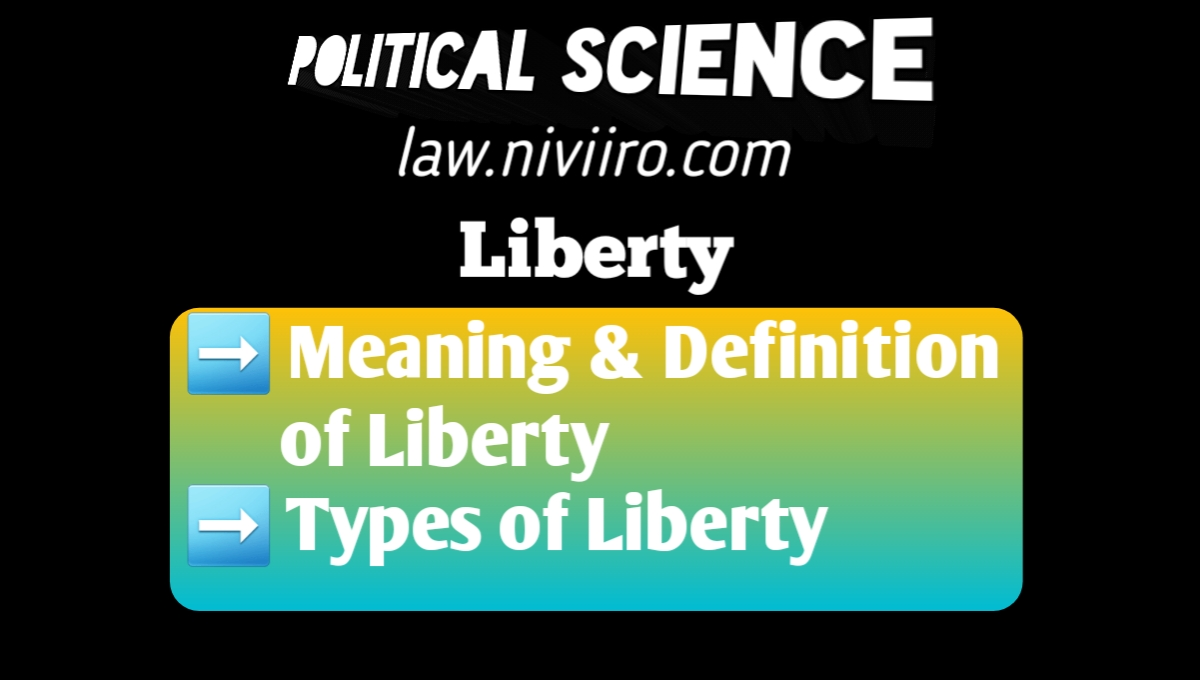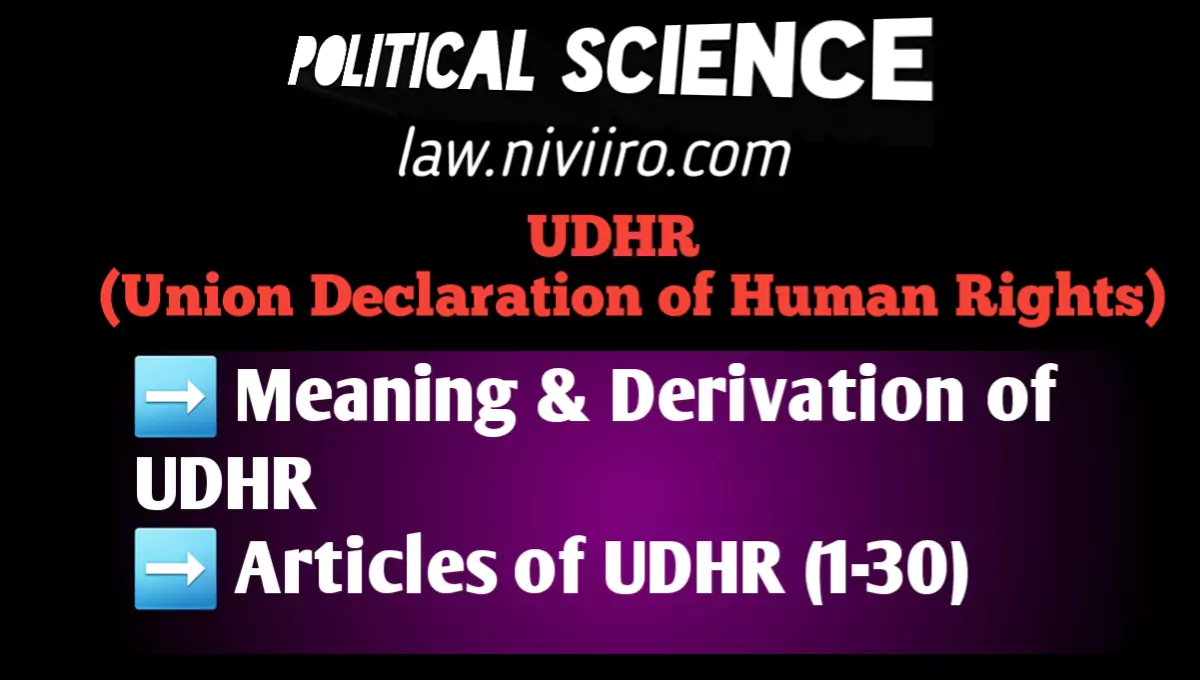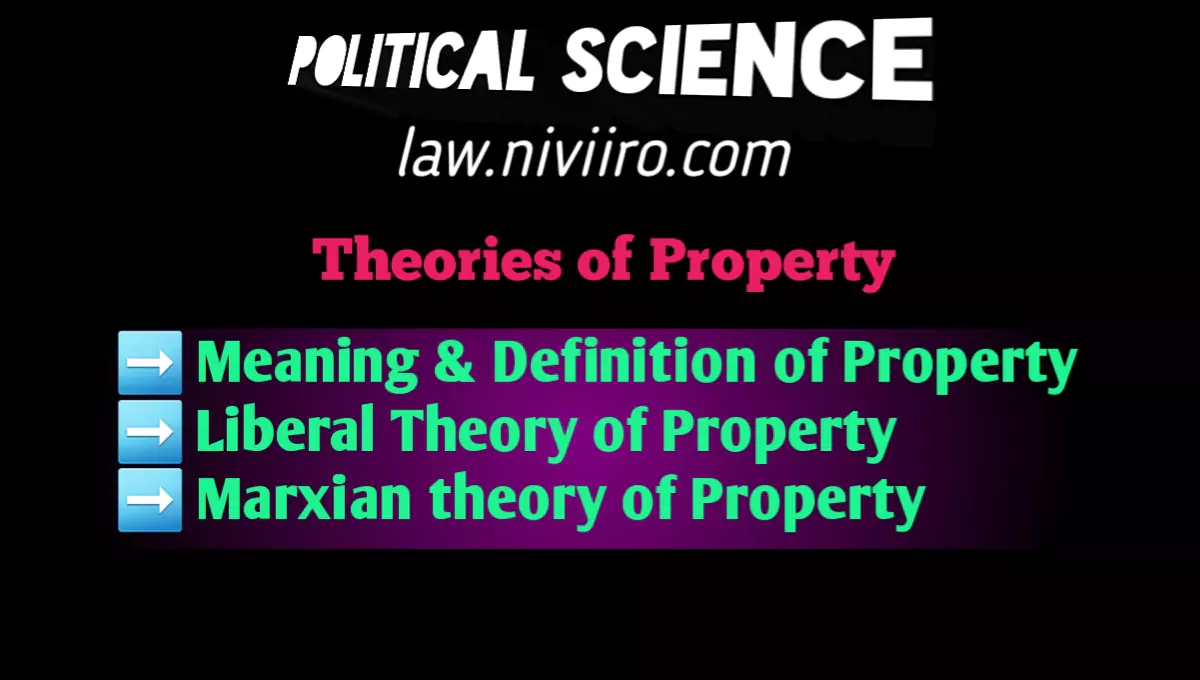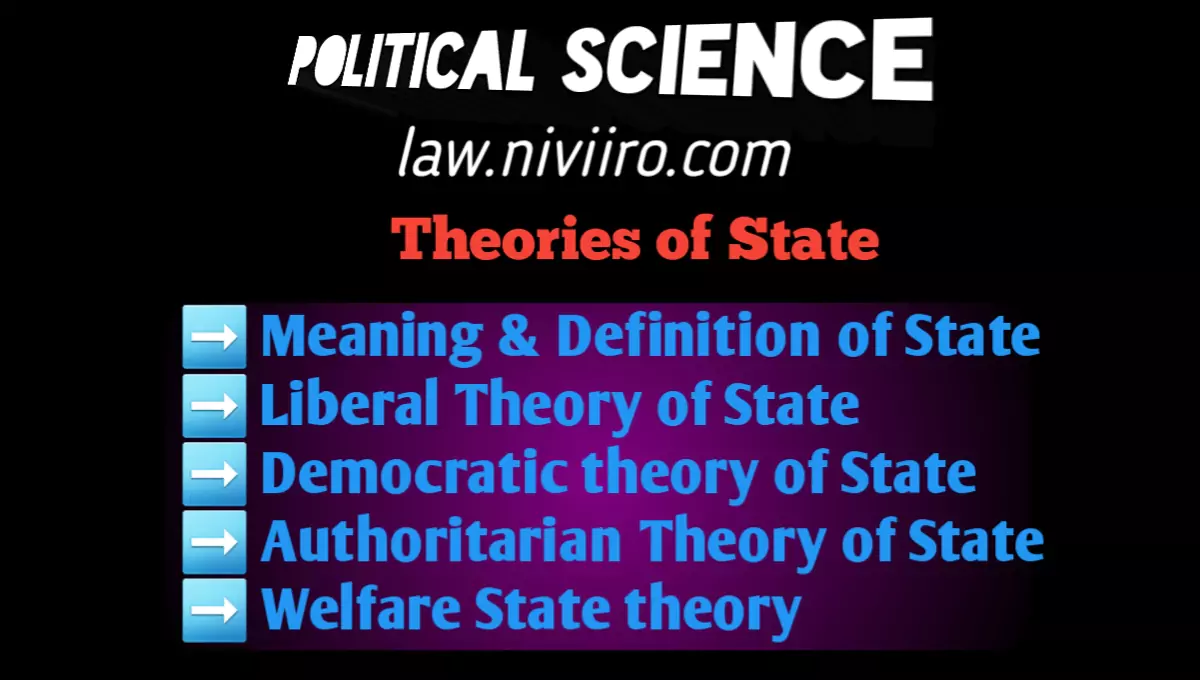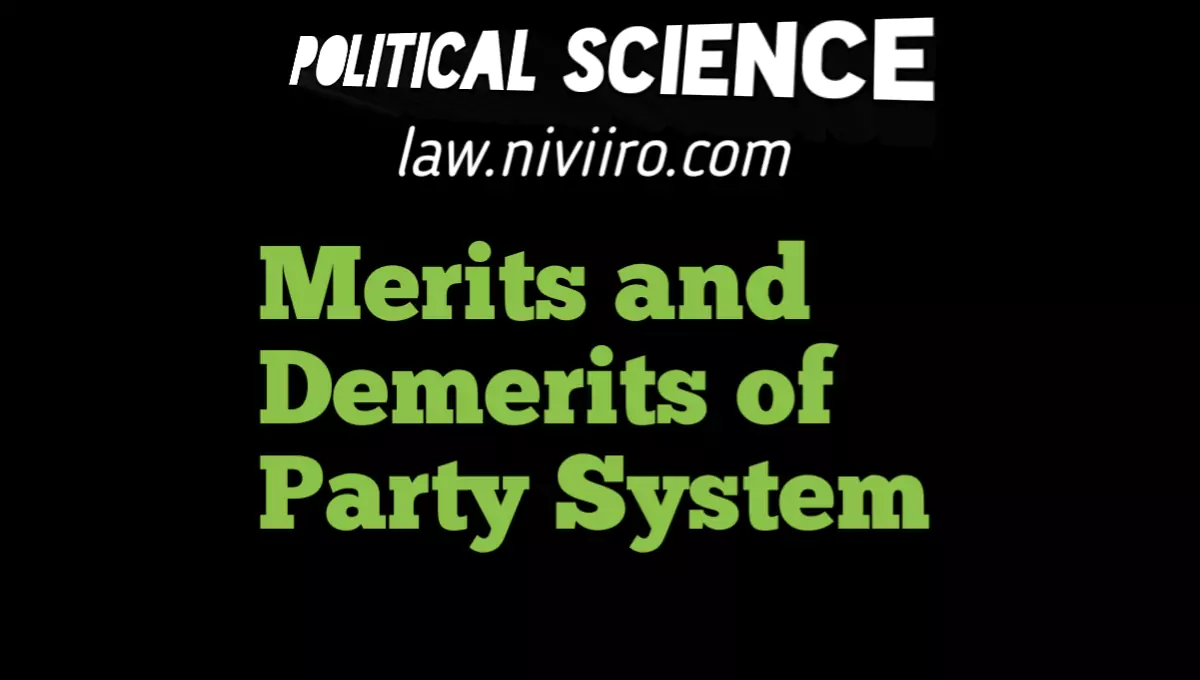The name “liberty” comes from the Latin word “Liber,” which means “free from all shackles.” It signifies that one can do whatever one wants, regardless of the circumstances. However, liberty does not allow a person to do anything they choose. Liberty in the sense of total freedom from all limitations is not conceivable. Such liberty is not possible. The fundamental liberty principle is that law is the condition of liberty.
Professor Harker has beautifully pointed out that just as the absence of ugliness does not mean presence of beauty so that absence of all restraints does not mean the presence of liberty “Liberty is possible only in an ordered state, a state where the legal and political aspects of sovereignty coincide or nearly coincide” “Historic experience”, says Professor Laski, “has evolved for us rules of convenience which promote right- living; and to compel obedience to them is a justifiable limitation of freedom”. He defines liberty as “the eager maintenance of that atmosphere in which men have the opportunity to be their test selves”.
Definitions of Liberty
- According to Mahatma Gandhi. “Liberty does not mean the absence of restraint but it lies in development of liberty”
- According to Seeley, “Liberty is the opposite of over-government”
- McKechnie believes that “Freedom is not the absence of all restraints, but rather the substitution of rational ones for the irrational”.
- “Liberty”, says Professor G.D.H. Cole. “the freedom of the individual to express without external hindrances to personality”.”
- “Liberty”, according to Mr. Burns. “means liberty to grow to one’s natural height, to develop one’s abilities”.
- Laski maintains, “Without rights there cannot be liberty, because without rights, men are the subjects of law unrelated to the needs of personality”.
- According to Gettell. “Liberty is the positive power of doing and enjoying those things which are worthy of enjoyment and work”.
Based on the definitions provided above, we can conclude that liberty is a very valuable quality in a state without which human beings cannot develop their personalities. “By liberty, I mean the secure enjoyment by individuals and natural and spontaneous groups of individuals, such as a nation, church, or trade union, of the power to think their own thoughts and express and act on them, using their own gifts in their own way under the shelter of law, provided they do not impair the corresponding rights of others,” Ramsay Muir maintains.
Positive and Negative Conceptions of Liberty
Liberty is divided into two phases: positive and negative. The positive view of liberty expresses the freedom to do something, whereas the negative view expresses the freedom not to do something. Negative liberty implies that there should be no impediment to one’s acts. Positive liberty refers to the ability to do something. Individuals should have the right and opportunity to develop their personalities. J.S. Mill meant negative liberty when he said liberty. He claimed that man and his acts should not be restrained in any way.
There should be no barrier in man’s path. This restriction could be positive or negative. But J.S. Mill does not allow any hindrance. For example, if he is not on public duty at the moment, he enables the individual to drink wine. He has no idea whether or not drinking will impair his health. This is the reason our government enacted the Prohibition Act. This is why, according to Professor Barker, “John Sutart Mill was the prophet of an empty liberty because he had a clear philosophy of rights through which the concept of liberty attains a concrete meaning.”
Different Kinds of Liberty
Liberty is of the following kinds :
- Natural Liberty.
- Civil Liberty.
- National Liberty.
- Personal Liberty.
- Economic Liberty.
- Political Liberty.
Natural Liberty
First and foremost, there is the concept of natural liberty, which denotes unrestricted freedom to do whatever one wants. It is an unscientific use of liberty, according to Professor R.N. Gilchrist. He defines natural liberty as follows: “Everyone has a vague notion of liberty and a desire for it, but among ten people that using the word, perhaps no two will be able to explain exactly what they mean, or if they do, will agree on their definitions. This general unscientific use of the word we may call Natural Liberty”.
As a result, natural liberty appears to be a licence rather than a liberty. Natural liberty denotes lack of all limitations an unrestricted freedom to do anything one likes Just like a lion is free to do anything it wants in the forest, a man should be free to do whatever he wants in civilization.
Thus, it is very obvious that natural liberty is founded on brute force. John Locke maintained that in the state of nature people enjoyed the right to life, liberty and property. But it is entirely erroneous because it is only the state that guarantees the enjoyment of these rights.
Civil Liberty
Secondly, there is the concept of Civil Liberty, which refers to the Rule of Law. According to Barker, civil liberty, “consists in three differently expressed articles: physical freedom from injury or threat to life, health, and movement of the body; intellectual freedom for the expression of thought and belief; and practical freedom for the exercise of will and choice in the general field of contractual action and relations with other persons.” Civil liberty denotes the absence of unreasonable and illegitimate limitations.
It refers to the freedom that man has in society. It is prevalent in the state. It denotes the exercise of our rights within the confines of the law. The law guarantees the protection of civil liberties. The state’s laws guarantee the protection of civil liberties. Gettell has very aptly remarked in this connection, “Definite law, sure enforcement and equality before law marked the advance of civil liberty of man to man”.
National Liberty
We mean the liberty of the nation or country when we say national liberty. The following lines are carved on our Central Secretariat building in Delhi: “Liberty does not descend upon a person. People must raise themselves to liberty. Liberty is a blessing that must be gained in order to be enjoyed”. Like individuals, nations also think in terms of liberty. National liberty exists when a nation or group is self-sufficient and sovereign. In fact, national liberty is another term for national sovereignty. Every state or nation aspires to maintain its independence. And progress of the nation or state is impossible without independence.
People cannot enjoy the joys of life in a slave country. And anytime a country is enslaved by imperialistic powers, the slave country continues to make efforts and sacrifices until it is able to free itself from the clutches of the foreign yoke. India endured unthinkable sacrifices and fought constantly against the Turks in order to restore and regain its independence. The Mughals and the British These sacrifices are widely documented in Indian history’s golden pages. Likewise, in the nineteenth century Italy struggled against Austrian yoke and ultimately succeeded in restoring its independence.
The sacrifices undertaken by Italy and the great actions performed by Italy’s gallant leaders are clearly documented in the golden pages of Italian history. Greece and Bulgaria fought against the Turkish empire’s tyranny in the nineteenth and twentieth centuries, eventually achieving their independence.
Personal Liberty
Fourthly, we have the concept of personal liberty, which refers to the existence of conditions in which an individual can act freely without being subjected to arbitrary and unlawful restraint. In the opinion of F.A. Hayek, liberty is a “condition of men in which coercion of some by others is reduced as much as possible in society…. The state in which a man is not subject to coercion by the arbitrary will of another or other is often also distinguished an individual or personal freedom”.
Every person has the right not to allow another person to intrude in his or her personal matters. Every individual should have the freedom to dress, eat, live, marry, educate their children, and so on. The state should not meddle in an individual’s personal affairs. Such liberty is necessary for human society’s unfettered growth.
Economic Liberty
Fifthly, there is the concept of Economic Liberty, which refers to the freedom to earn one’s daily bread. In Laski‘s book “Grammar of Politics”, while defining economic liberty, Professor Laski says, “By economic liberty, I mean security and the opportunity to find reasonable significance in the earning of one’s daily bread. I must be free from the constant fear of unemployment and insufficiency which, perhaps more than other inadequacies, sap the whole strength of personality. I must be safeguarded against the wants of tomorrow”. In basic terms, every individual, regardless of caste, colour, or creed, should be free to earn his or her daily bread by legitimate means.
Political Liberty
Sixthly, there is the concept of political liberty, which refers to people’ freedom to engage in the political life and affairs of the state. Laski defines political liberty as the freedom of the individual to participate in governmental activities. He states. “I’m free to think freely about the substance of public business. I must be able to add my unique experience to the general barriers to obtaining a position of responsibility without hesitation or hindrance. I must be able to announce my opinion and to concert with others in the announcement of opinion”.
Political Liberty is referred to as “constitutional liberty” by Leacock, and “practically synonymous with democracy” by Gilchrist Fegard. Minimum rights are included in political liberty. These rights include the right to vote, the right to run for office, the freedom to express political opinions and criticise the government, and the right to petition, among others.
Related Post
Define liberty ?
1. According to Mahatma Gandhi. “Liberty does not mean the absence of restraint but it lies in development of liberty”
2. According to Seeley, “Liberty is the opposite of over-government”
what is the Positive and Negative Conceptions of Liberty ?
Liberty is divided into two phases: positive and negative. The positive view of liberty expresses the freedom to do something, whereas the negative view expresses the freedom not to do something. ….
Mention different Kinds of Liberty ?
1.Natural Liberty
2.Civil Liberty.
3.National Liberty.
4.Personal LibertY.
5.Economic Liberty.
6.Political Liberty.
What do you mean by Political Liberty ?
Laski defines political liberty as the freedom of the individual to participate in governmental activities.
Meaning of Civil Liberty ?
Civil liberty denotes the absence of unreasonable and illegitimate limitations.
References
- R.C. Agarwal, Political Theory
- M.P. Jain, Political Theory liberal and Marxiam
- Prof. H.C. Verma, Modern Political Theory
- Prof. S.L. Verma, Modern Political Theory
- V.D. Mahajan, Political Theory
- J.C. Johari, Political Science













